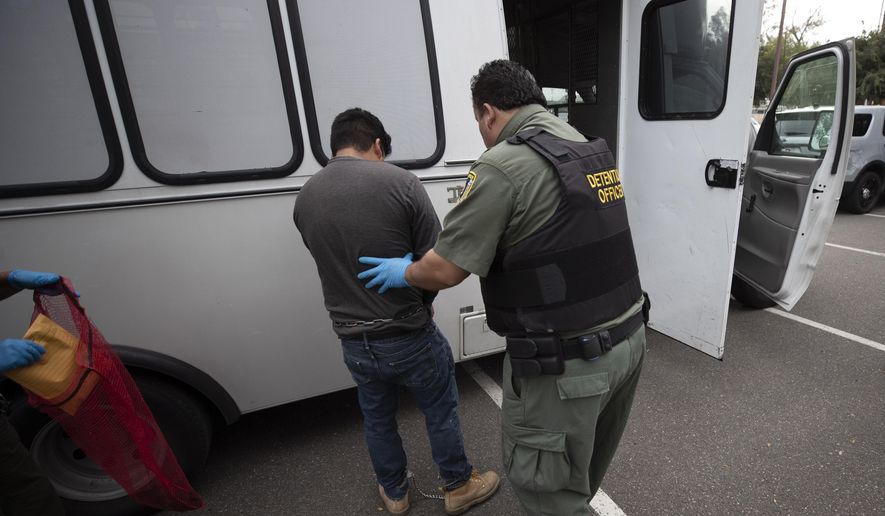An illegal immigrant caught with child pornography isn’t an automatic target for deportation under ICE’s new enforcement rules, The Washington Times has learned.
An Immigration and Customs Enforcement employee revealed the situation during an online town hall with Homeland Security Secretary Alejandro Mayorkas last week, according to notes of the forum.
The employee, who was not identified, posted a question to the chat asking if Mr. Mayorkas and ICE would create a system “to highlight cases that do not meet the standard guidelines” for deportation priorities but “still should be looked at.
“For example, a visa overstay arrested with child porn,” the employee wrote, adding it was not an “ag” — a reference to an aggravated felony, which is the minimum standard for becoming an automatic deportation priority under the new guidance, along with national security cases and recent border jumpers.
A “visa overstay” is the government’s term for someone who arrives in the U.S. on a legal temporary visitor’s permit who does not leave the country when his or her time is up. At that point they become illegal immigrants and deportable in the same category as someone who jumped the border without permission.
Mr. Mayorkas didn’t end up getting asked the question, but The Washington Times reached out to ICE, which didn’t deny the employee’s claim, but said crimes against children are “a top public safety priority” for the agency.
ICE also said that even cases that aren’t automatic priorities can still lead to arrests and deportations under the new Biden administration rules.
“It does not prohibit ICE officers from apprehending or detaining an individual who is unlawfully in the United States and falls outside of the specified priorities, however officers must request approval from their Field Office Director prior to making an arrest or other enforcement decision,” ICE told The Times.
That approval must be made in writing.
Jessica Vaughan, policy studies director at the Center for Immigration Studies, which backs stricter immigration controls, called that process “near meaningless.”
She said the paperwork requires a long write-up and police records, which she said sanctuary jurisdictions are likely to withhold anyway. She said the process often can’t be finished before the target is released by local authorities.
Ms. Vaughan has conducted her own review of past deportation cases and found hundreds of people who were ousted because of crimes against children that would not be classified as aggravated felonies. Under the Biden rules, she notes, those cases would not be automatic deportations.
Among them were 231 cases of sexual exploitation of a minor, 437 cases of fondling a child and 17 cases of kidnapping a minor for purposes of sexual assault.
She said she expects those same kinds of cases and at the same numbers this year, “but they will not be arrested and removed under Biden priorities.”
Other crimes that don’t automatically rise to the level of aggravated felonies include drunk driving, domestic violence, drug dealing, firearms offenses and some slayings.
“I know of one recent case where ICE lawyers determined that second degree murder was not an aggravated felony,” Ms. Vaughan said.
The current arrest and deportation guidance was a prominent topic on ICE employees’ minds during last week’s town hall with Mr. Mayorkas.
One question posted during the forum wondered why deportation officers needed “approval at headquarters level to make an arrest.” Another said the current guidelines ignore “security in our own neighborhoods.
“Criminals have been given a free pass in this administration. Who are these priorities protecting?” that ICE employee wrote.
Mr. Mayorkas didn’t address any of those questions but did tackle the priorities in general, saying every law enforcement agency he’s worked in has had guidance from up above about who was a valid target.
He said he’s getting weekly reports on how the current guidelines are working, and he expects to release final priorities in the coming weeks.
“This is where people can disagree from a criminal justice perspective, and we’ll disagree and I’ll make my decision as I think best for our law enforcement objectives and then we’re all going to move together accordingly,” he said.
• Stephen Dinan can be reached at sdinan@washingtontimes.com.




Please read our comment policy before commenting.